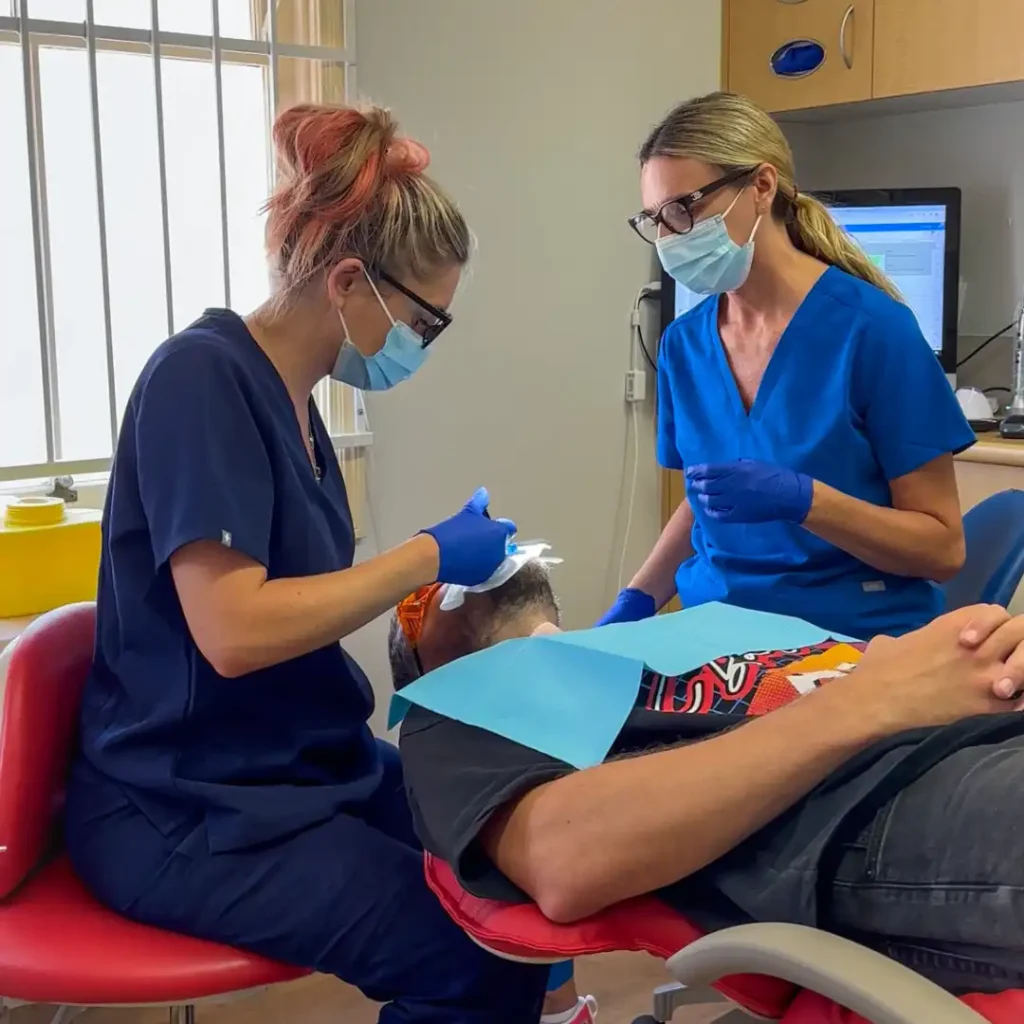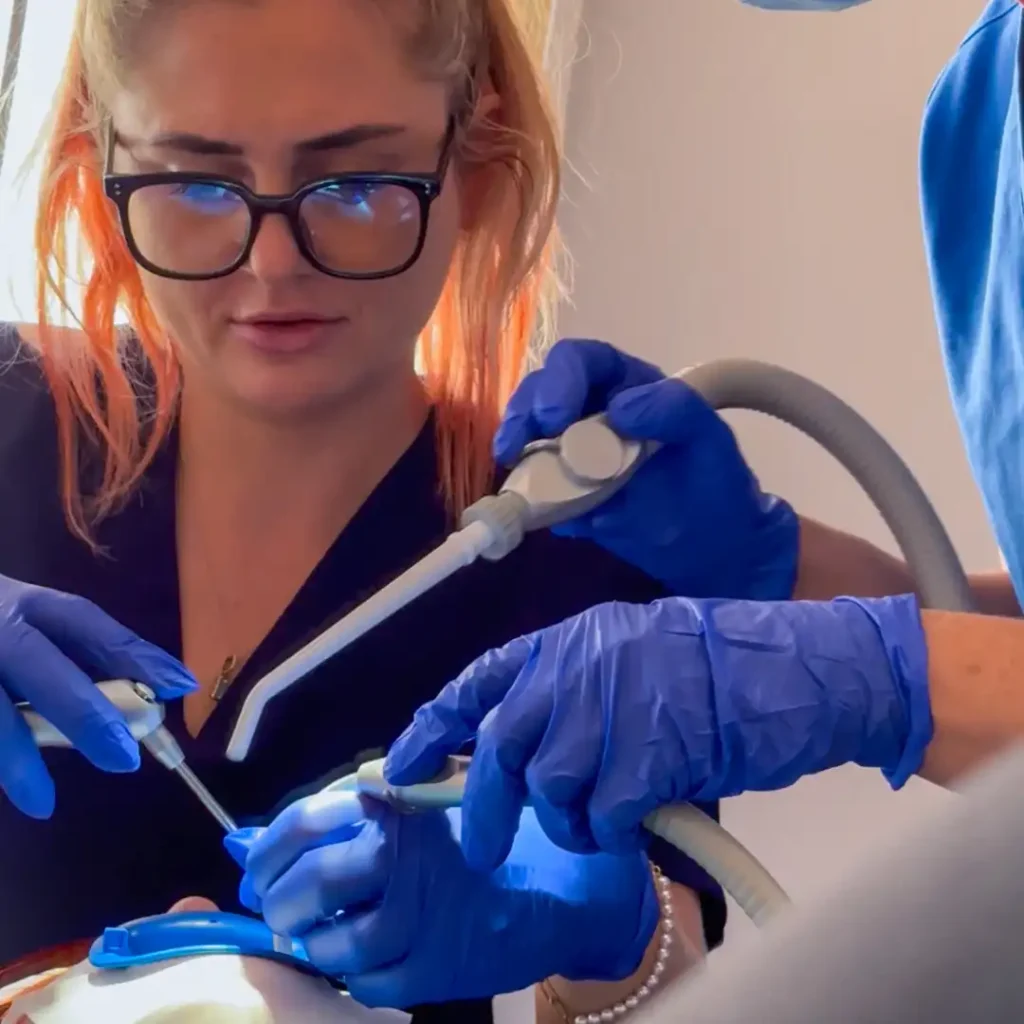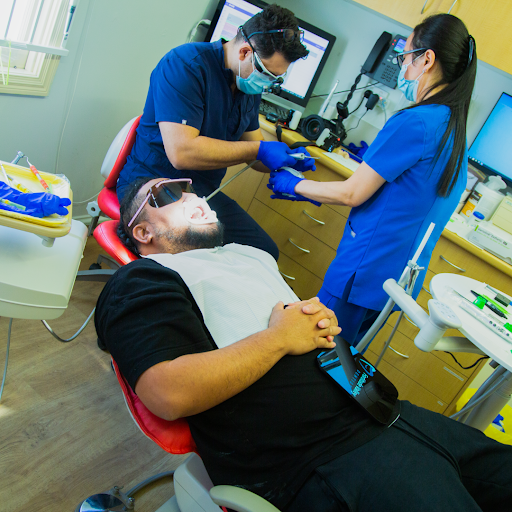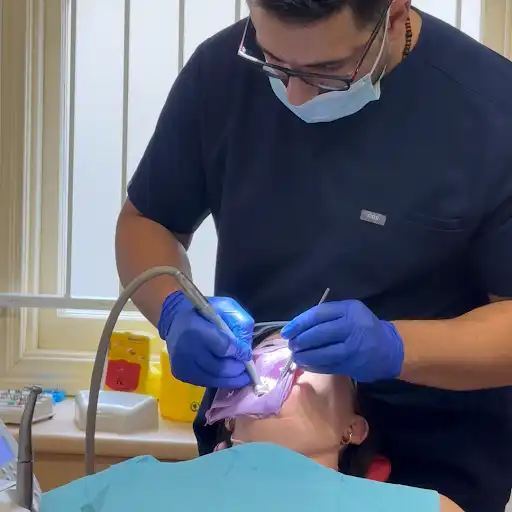Having trouble getting a restful night’s sleep? The cause might be closer than you think — right inside your mouth. While many people associate sleep issues with stress or lifestyle factors, oral health problems can also play a major role in how well you rest. From jaw tension and tooth pain to snoring and teeth grinding, dental concerns often go unnoticed but can significantly affect your sleep quality and overall well-being.
At Fortitude Valley Dentist we understand that achieving good oral health goes beyond having a beautiful smile — it’s also about improving your daily comfort and restoring balance to your life. A healthy mouth contributes to better breathing, reduced pain, and deeper, more restorative sleep.
Your mouth is the gateway to your body’s overall health, and even minor dental issues can have far-reaching effects. For example, chronic tooth pain can make it hard to fall asleep, gum inflammation may cause discomfort at night, and jaw clenching or grinding (known as bruxism) can lead to restless nights and morning headaches. In some cases, oral conditions like sleep apnoea are linked to the positioning of the jaw or airway obstruction, which can cause interrupted breathing during sleep.
When left untreated, these issues not only disrupt your rest but can also contribute to fatigue, irritability, and difficulty concentrating during the day. That’s why identifying and addressing oral health concerns early can make a world of difference — helping you wake up refreshed, energised, and ready to take on the day.
At Fortitude Valley Dentist, we take a holistic approach to dental care. Our team looks beyond just your teeth and gums, considering how your oral health impacts your entire body — including your ability to sleep soundly. Whether you’re dealing with chronic jaw pain, snoring, or nighttime grinding, we’re here to help you uncover the cause and provide gentle, effective treatment solutions tailored to your needs.
Because when your mouth is healthy, your whole body — and your sleep — benefits too.

How Oral Health Impacts Sleep
Your oral health and sleep are more connected than many people realise. While sleep problems are often blamed on stress or lifestyle habits, dental issues can quietly interfere with your ability to rest — sometimes without you even noticing. The mouth plays a key role in breathing, relaxation, and comfort, so when oral health problems arise, they can disrupt the natural rhythm of your sleep cycle.
Here are some of the most common ways oral health can affect your sleep:
- Tooth Pain or Sensitivity
Ongoing tooth pain — whether from cavities, infection, or gum inflammation — can make it difficult to fall asleep or stay asleep through the night. The discomfort often worsens when you lie down due to increased blood flow to the head, which can heighten pain sensitivity. Even mild tooth sensitivity can lead to restless nights and fatigue the next day.
- Jaw Tension or Temporomandibular Joint (TMJ) Disorders
The jaw joint (TMJ) connects your jaw to your skull and plays a crucial role in speaking and chewing. When this joint becomes strained or misaligned, it can lead to discomfort, popping sounds, and tension in the surrounding muscles. TMJ disorders are often linked to stress and teeth grinding, both of which can prevent you from resting comfortably and contribute to morning headaches or facial pain.
- Bruxism (Teeth Grinding)
Bruxism is the unconscious habit of clenching or grinding your teeth, usually while sleeping. Over time, it can cause worn-down enamel, tooth fractures, gum recession, and jaw pain. Many people are unaware they grind their teeth until their dentist notices the damage — or until they experience symptoms like tight jaw muscles or morning headaches.
- Snoring and Mild Sleep Apnoea
Snoring isn’t just a nuisance — it can be a sign of a deeper issue such as mild sleep apnoea, where breathing temporarily stops during sleep. In many cases, this is linked to the positioning of the jaw or tongue, which may obstruct the airway. Dentists can help manage these conditions through custom-fitted oral appliances that gently reposition the lower jaw and tongue to keep airways open, allowing for smoother breathing and quieter nights.
When these oral health problems persist, they can lead to chronic sleep deprivation, which affects mood, focus, and overall health. Fortunately, most of these conditions can be treated effectively with proper dental care and early intervention.At Fortitude Valley Dentist, our team takes a comprehensive approach to identifying and managing oral conditions that impact sleep. Through thorough examination and personalised treatment, we can help restore not only your oral health — but also the quality of your

Signs Your Dental Health May Be Disrupting Your Sleep
Sleep plays a vital role in your overall health, and when it’s disrupted, the effects can be felt throughout your entire day. However, many people overlook the connection between their dental health and poor sleep quality. Recognising the signs early can help you take proactive steps toward better rest and improved oral wellness.
Here are a few common indicators that your dental health may be affecting your sleep:
- Sore Jaw or Headaches Upon Waking
If you often wake up with a sore jaw, facial tension, or dull headaches, you may be grinding or clenching your teeth at night — a condition known as bruxism. This unconscious habit puts excessive pressure on your teeth and jaw joints, leading to muscle strain, tooth wear, and even TMJ-related pain. Over time, it can also contribute to fatigue and reduced sleep quality.
- Tooth Pain or Gum Discomfort
Persistent toothache or gum tenderness can make it difficult to fall asleep or may wake you up during the night. Dental issues such as cavities, abscesses, or gum disease cause inflammation and sensitivity that worsen when you’re lying down. Left untreated, these conditions can interfere not only with your sleep but also with your overall health, as oral infections can spread or trigger inflammation elsewhere in the body.
- Snoring or Interrupted Breathing: If your partner has noticed loud snoring, gasping, or pauses in your breathing while you sleep, it could be a sign of obstructive sleep apnoea (OSA). In many cases, this condition is linked to the positioning of the jaw or tongue, which can block airflow during the night. Dentists can help manage mild to moderate cases of sleep apnoea through custom oral appliances that reposition your lower jaw and open your airway, allowing you to breathe more easily and sleep more soundly.
- Restlessness or Frequent Waking
Even if you’re not aware of any pain, recurring awakenings throughout the night may be a subtle sign that your oral health is affecting your comfort. Unconscious clenching, jaw misalignment, or discomfort from dental problems can all interfere with your natural sleep cycle.
If you notice any of these signs, it’s important to address them early. Dental-related sleep disturbances rarely improve on their own — and tackling the root cause can make a world of difference.At Fortitude Valley Dentist, we take a comprehensive approach to your oral and sleep health. Our experienced team can help diagnose underlying dental issues, provide targeted treatments, and restore your comfort so you can enjoy a peaceful, rejuvenating night’s rest.
The Link Between Oral Health and Overall Well-being
Your oral health is much more than just having a bright smile — it’s a vital component of your overall health and well-being. Poor dental hygiene and untreated oral conditions don’t just disrupt sleep; they can also have far-reaching effects on your body, contributing to systemic health issues that impact your quality of life.
Cardiovascular Health
Research has shown a strong connection between gum disease (periodontitis) and heart health. Inflammation caused by oral infections can enter the bloodstream, increasing the risk of heart disease, stroke, and high blood pressure. Maintaining healthy gums is therefore not only essential for your mouth but also for your heart.
Diabetes Management
There is a two-way relationship between diabetes and oral health. Poor oral hygiene and gum disease can make it harder to control blood sugar levels, while diabetes increases susceptibility to infections, including in the mouth. Regular dental care and proper oral hygiene are key components of managing diabetes effectively.
Mental Health and Stress
Chronic oral pain or discomfort, combined with poor sleep due to dental issues, can elevate stress levels and affect mental well-being. Sleep deprivation impacts concentration, mood, and overall cognitive function. By addressing dental problems, you can reduce pain and improve sleep, contributing to better mental and emotional health.
Holistic Approach to Wellness
Treating oral health as part of your holistic wellness plan ensures that you’re not only maintaining a beautiful smile but also supporting your cardiovascular, metabolic, and mental health. Regular dental check-ups, preventive care, and timely interventions play a crucial role in preventing complications that can affect both sleep and systemic health.
At Fortitude Valley Dentist, we focus on the bigger picture — helping you achieve optimal oral health while supporting your overall well-being. A healthy mouth contributes to better sleep, improved energy, and a stronger, healthier body.
How Dental Care Can Improve Your Sleep

At Fortitude Valley Dentist, we understand that quality sleep is just as important as a healthy smile. Our comprehensive dental care doesn’t just focus on treating oral health issues — it also aims to improve your comfort, relaxation, and overall well-being. By identifying and addressing the dental causes of poor sleep, we can help you wake up feeling refreshed, energised, and pain-free.
Here’s how professional dental care can make a real difference in your sleep quality:
- Comprehensive Dental Check-ups
Regular dental visits allow us to spot early signs of conditions like bruxism, gum disease, or jaw misalignment before they become major problems. During your check-up, we’ll assess not only your teeth and gums but also your bite alignment, jaw function, and oral tissues. Early detection helps us create a personalised treatment plan that protects your teeth and promotes healthier, more restful sleep. - Custom Night Guards
If you grind or clench your teeth while sleeping, a custom-fitted night guard can make all the difference. Unlike store-bought guards, ours are professionally designed to fit your mouth comfortably, providing optimal protection against enamel wear and jaw strain. They help cushion your teeth, relax your jaw muscles, and prevent headaches or soreness — allowing you to rest peacefully through the night. - Oral Appliances for Snoring or Sleep Apnoea
For patients who snore or suffer from mild to moderate sleep apnoea, we offer oral appliances that gently reposition the lower jaw and tongue. This small adjustment keeps your airway open, improving airflow and reducing snoring. It’s a simple, non-invasive alternative to CPAP therapy, helping you and your partner enjoy quieter, more restorative nights. - Pain Relief and Preventive Treatments
Pain or discomfort from untreated cavities, gum inflammation, or cracked teeth can interfere with your sleep and overall comfort. At Fortitude Valley Dentist, we focus on gentle, effective treatments designed to eliminate pain and prevent future problems. Whether it’s restoring damaged teeth, treating infection, or improving gum health, our goal is to create the foundation for both a healthier mouth and better sleep.
Sleep disturbances related to oral health don’t have to be something you live with. With the right care and a customised dental plan, you can enjoy better sleep, improved health, and greater day-to-day comfort.
At Fortitude Valley Dentist, we’re here to help you achieve that balance — because a healthy smile goes hand in hand with a good night’s rest.
Tips for Better Oral Health and Sleep at Home
Improving your sleep often starts with simple habits you can implement at home. By maintaining good oral hygiene and adopting practices that promote relaxation, you can support both your dental health and overall sleep quality. Here are some actionable tips:
Maintain Regular Brushing and Flossing
Brushing twice a day and flossing daily helps prevent cavities, gum disease, and other oral issues that can interfere with sleep. A clean, healthy mouth reduces discomfort and promotes overall well-being, making it easier to fall and stay asleep.
Avoid Caffeine and Sugar Before Bed
Caffeine and sugary foods can increase energy levels and make it harder to fall asleep. Additionally, sugar can contribute to tooth decay and gum inflammation, which may lead to nighttime discomfort. Opt for lighter snacks and herbal teas in the evening to support both oral health and restful sleep.
Stay Hydrated, but Minimise Late-Night Fluids
Proper hydration helps maintain saliva production, which naturally protects teeth and gums. However, drinking large amounts of water right before bed can lead to frequent trips to the bathroom, disrupting sleep. Aim to hydrate consistently throughout the day rather than in the last hour before sleep.
Use Stress-Relief Techniques to Reduce Jaw Clenching
Stress is a common trigger for bruxism (teeth grinding) and jaw tension. Incorporate relaxation practices such as gentle stretching, deep breathing exercises, meditation, or a warm compress for your jaw before bed. Reducing stress can significantly decrease nighttime grinding and improve both sleep quality and oral comfort.Create a Sleep-Friendly Environment
Ensure your bedroom is dark, quiet, and cool. Limit screen time before bed, as blue light can interfere with your body’s natural sleep cycle. A calm environment complements healthy oral habits, supporting uninterrupted, restorative sleep
FAQ: Oral Health and Sleep
Including a Frequently Asked Questions (FAQ) section helps readers quickly find answers to common concerns while boosting SEO for relevant search terms. Here are some key questions and answers related to oral health and sleep:
Can tooth pain really keep me awake?
Yes. Tooth pain, whether from cavities, infections, or gum disease, can make it difficult to fall asleep or may wake you during the night. Pain often intensifies when you lie down due to increased blood flow to the head. Addressing the underlying dental issue can relieve discomfort and help restore restful sleep.
How does grinding my teeth affect my long-term dental health?
Grinding or clenching your teeth (bruxism) can wear down enamel, cause fractures, damage dental restorations, and strain jaw muscles. Over time, this can lead to chronic pain, TMJ disorders, and even tooth loss. Early intervention, such as a custom night guard, can protect your teeth and reduce the negative impact on both your oral health and sleep quality.
Are oral appliances better than CPAP for mild sleep apnoea?
For patients with mild to moderate obstructive sleep apnoea, custom oral appliances can be an effective alternative to CPAP therapy. These devices reposition the lower jaw and tongue to keep the airway open, reducing snoring and improving breathing during sleep. They are non-invasive, portable, and generally more comfortable for many patients. However, the best solution depends on the severity of your condition, so a professional assessment is essential.
Can poor oral health contribute to snoring?
Yes. Misaligned teeth, jaw issues, or tongue positioning can partially block the airway during sleep, increasing the likelihood of snoring. Dental interventions, such as oral appliances or bite adjustments, can help reduce snoring and promote better sleep.
How often should I see a dentist to prevent sleep-related oral issues?
Regular dental check-ups every six months are recommended to monitor for cavities, gum disease, and jaw problems. Early detection allows for timely intervention, preventing oral health issues from interfering with your sleep.
What to Expect During a Dental Sleep Assessment
If you suspect that your oral health is affecting your sleep, a dental sleep assessment can help identify the underlying causes and provide effective solutions. At Fortitude Valley Dentist, our approach is thorough, personalised, and focused on improving both your oral health and quality of sleep. Here’s what you can expect during your assessment:
- Comprehensive Dental Examination
Your visit begins with a detailed dental check-up to assess the overall health of your teeth, gums, and oral tissues. We look for signs of cavities, gum disease, and wear patterns that may indicate teeth grinding or other issues impacting your sleep. - Bite and Jaw Alignment Evaluation
A proper bite and well-aligned jaw are essential for comfort during sleep. Our team evaluates your jaw function and bite alignment, identifying potential issues like TMJ disorders or malocclusion that may contribute to snoring, clenching, or bruxism. - Sleep Habits Review and Referrals
Understanding your sleep patterns is key to finding the right solution. We’ll discuss your sleep habits, snoring patterns, and any symptoms of sleep apnoea. If necessary, we can refer you for a formal sleep study to ensure a comprehensive assessment of your condition. - Custom Solutions and Treatment Plan
Based on the findings, we’ll recommend tailored solutions such as custom night guards, oral appliances for snoring or sleep apnoea, and other preventive treatments. Our goal is to relieve discomfort, protect your teeth, and improve your sleep quality through personalised care.
A dental sleep assessment helps uncover hidden oral health issues that may be affecting your rest. With early detection and a customised plan, you can achieve better sleep, reduced discomfort, and improved overall health
Take Action for Better Sleep and Oral Health

If you suspect that your oral health is affecting your sleep, now is the perfect time to take action. Dental-related sleep disturbances often start small — perhaps with mild jaw discomfort, occasional snoring, or subtle tooth pain — but can gradually worsen if left untreated. Over time, these issues can affect your mood, focus, and overall health, leaving you feeling tired, stressed, and less productive.
At Fortitude Valley Dentist, we’re committed to helping you uncover and address the root cause of your sleep problems. Through our personalised and holistic approach, we can assess your oral health, identify any underlying dental concerns, and develop a tailored treatment plan designed to restore your comfort and improve your quality of rest.
Our compassionate team understands that good sleep is essential for both mental and physical well-being. Whether you need a custom night guard, treatment for jaw pain, or a snoring solution, we’ll guide you through every step — ensuring your experience is comfortable, supportive, and effective.
Don’t let oral health issues stand in the way of a good night’s sleep.
Take the first step toward a healthier smile and more restful nights by booking an appointment with Fortitude Valley Dentist today. Together, we’ll help you achieve the balance between oral health and quality sleep — so you can wake up refreshed, confident, and ready to take on the day.
Sleep soundly. Smile confidently. Live healthier.


